Two wars, Trump and the miraculous rehabilitation of George Bush
When Bush left office, with his two calamitous wars still raging and only a third of Americans approving of his job performance, it would have been hard to imagine his image would ever recover, writes Ben Terris
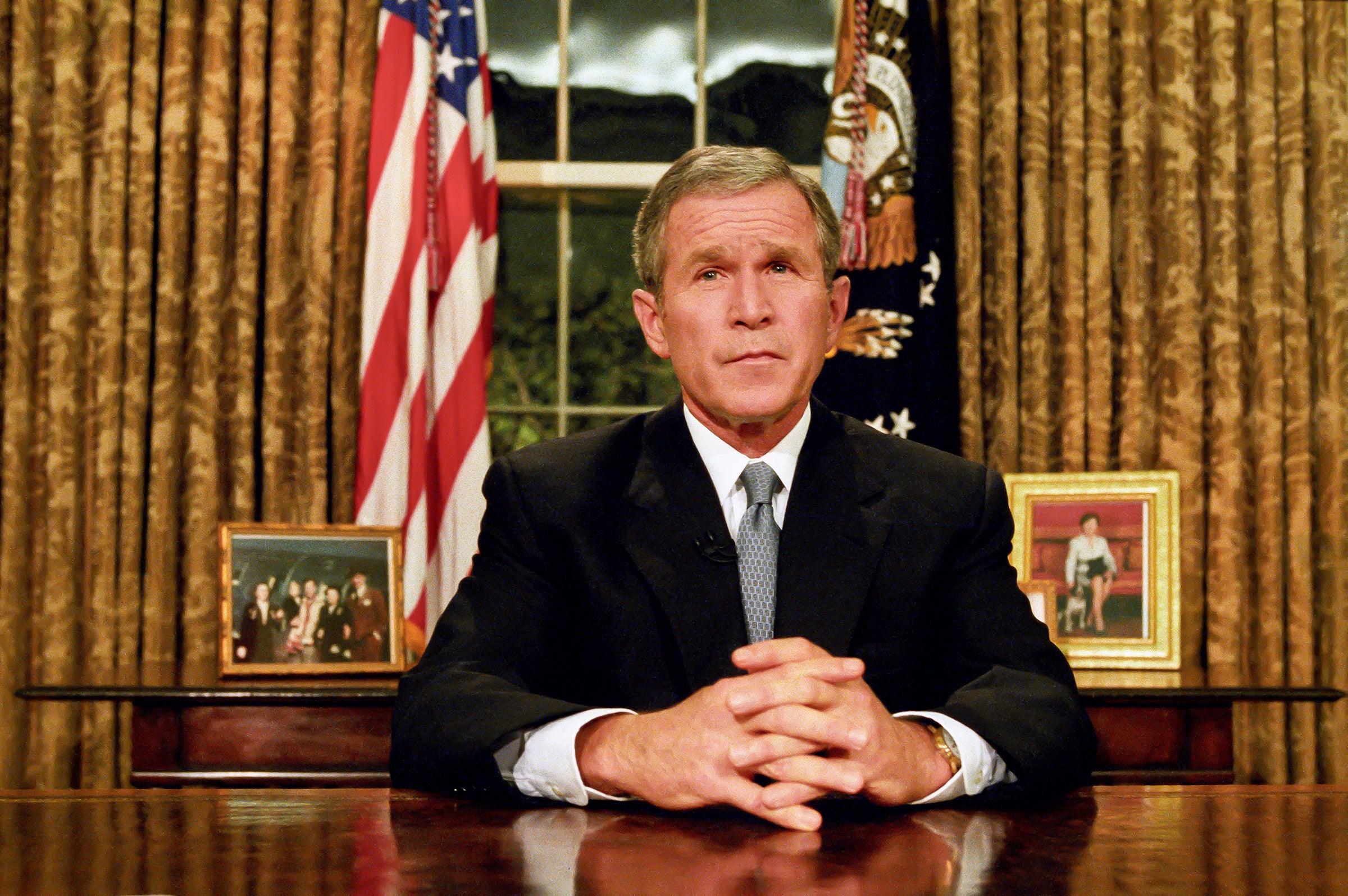
Your support helps us to tell the story
From reproductive rights to climate change to Big Tech, The Independent is on the ground when the story is developing. Whether it's investigating the financials of Elon Musk's pro-Trump PAC or producing our latest documentary, 'The A Word', which shines a light on the American women fighting for reproductive rights, we know how important it is to parse out the facts from the messaging.
At such a critical moment in US history, we need reporters on the ground. Your donation allows us to keep sending journalists to speak to both sides of the story.
The Independent is trusted by Americans across the entire political spectrum. And unlike many other quality news outlets, we choose not to lock Americans out of our reporting and analysis with paywalls. We believe quality journalism should be available to everyone, paid for by those who can afford it.
Your support makes all the difference.In early July, on the very same day the Pentagon announced it had completed 90 per cent of the planned withdrawal from Afghanistan, former president George W Bush sat for a rare, nationally televised interview.
“Happy birthday, Dad!” shouted his daughter Jenna Bush Hager, a co-host of the Today show.
Later in the interview, she asked: “Do you feel 75?”
“Well, it just seemed like yesterday I felt like I was 74,” said the ex-president, from his house in Maine, looking very retired in a blue polo shirt and flashing that familiar smirk.
“I wanna know,” asked the other host, Hoda Kotb, later in the segment, “if Jenna gives you really cool gifts?”
“One year she gave me a poo-poo cushion,” said Bush.
“Dad!” the former first daughter sighed. “A poo-poo cushion is not the name of it! A whoopee cushion!”
An enhanced interrogation, this was not.
When Bush left office, with his two calamitous wars still raging and only a third of Americans approving of his job performance, it would have been hard to imagine a network treating him like a goofy dad whose most noteworthy intelligence failure might be flubbing the name of a false fart bag. But a lot has happened since 2009.
Bush may have started the Iraq War on false pretences, but at least he hadn’t inspired an insurrection that turned the US Capitol into a combat zone. At least he had made efforts to distance himself from the racists and xenophobes in his party rather than cultivate their support. At least he hadn’t gone so far as to call his domestic adversaries “evil”.
“He looks like the Babe Ruth of presidents when you compare him to Trump,” former Senate majority leader and onetime Bush nemesis Harry Reid, D-Nev, says in an interview. “Now, I look back on Bush with a degree of nostalgia, with some affection, which I never thought I would do.”
“I was so aghast at Trump that I unfortunately didn’t have space left to be mad at Bush,” says Jason Kander, a Democratic politician who served in Afghanistan. “In comparison to Trump, I am able to look at Bush and say: at least that guy was trying.”
It’s a lot to ask for people to remember how long Bush stayed on vacation before turning his attention to Hurricane Katrina
“People have a more benign, almost fond view of him – common to almost all ex-presidents,” the comic-strip artist and frequent Bush critic Garry Trudeau tells The Washington Post in an email, “and I assume he likes it that way.”
Behold, the incredible disappearing Dubya.
The former boogeyman of the American left, once viewed as rash, incurious and overly trusting of his gut, has been eclipsed by an even more absurd, menacing figure.
Meanwhile, the American right has kicked him down the same memory hole as his father.
When Bush does appear in public, he presents as harmless and affable: sharing hard candies with Michelle Obama, or hanging out at a Dallas Cowboys game with Ellen DeGeneres.
Now, the Today anchors were questioning the ex-president, who famously had taken up painting in retirement, on the accuracy of a portrait he had made of his daughter. “Can you just try to thin out my face a little bit?” Bush Hager asked.
“Look,” Bush chuckled. “I can only paint it the way it is, hon.”
Not that Bush seems to mind the recent alterations to his own portrait.
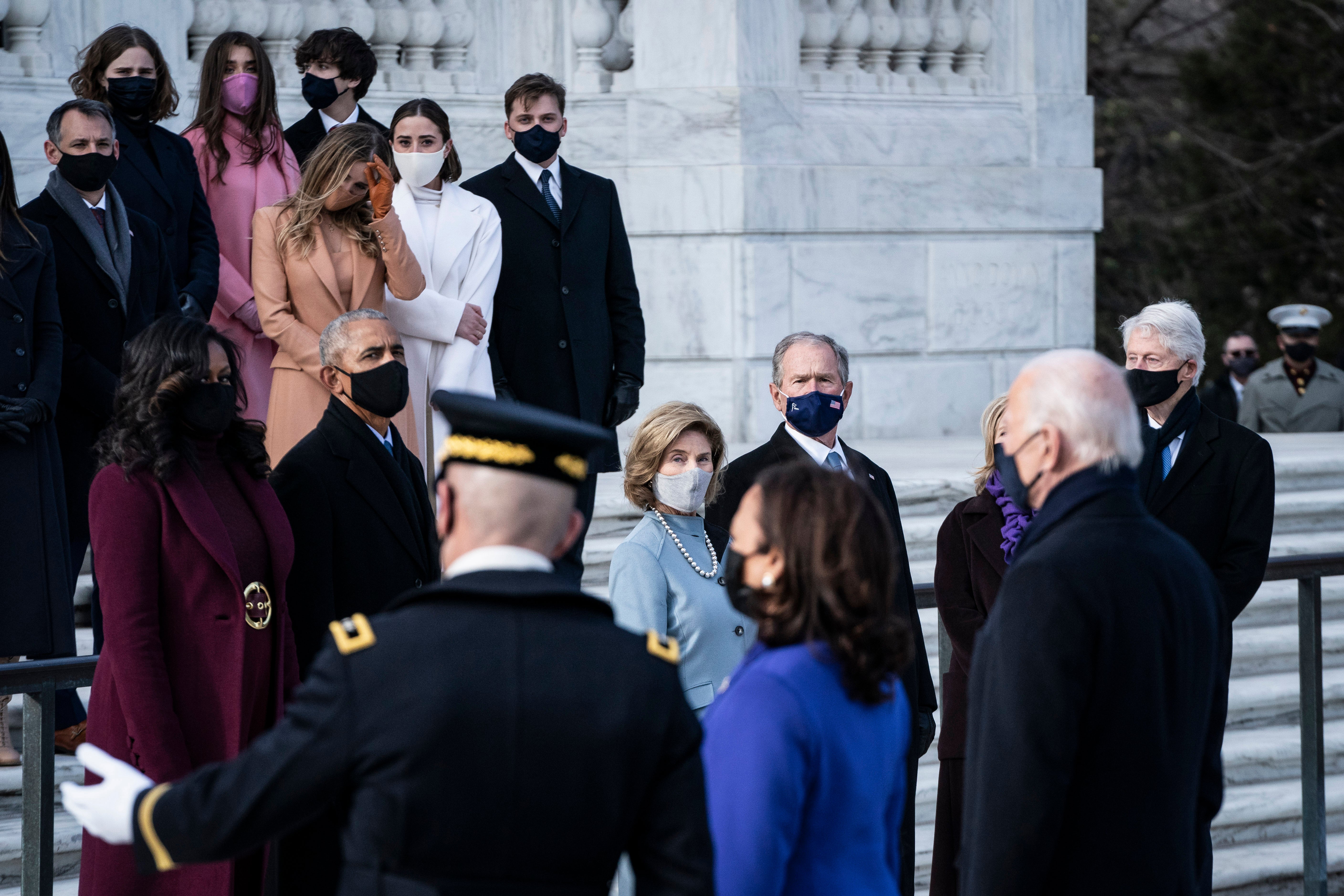
There are many who couldn’t forget the ugliest parts of his legacy if they tried: the tortured, the dead, the bereaved. More than 7,000 US service members killed in Afghanistan and Iraq, according to Brown University’s Watson Institute for International and Public Affairs, along with tens of thousands of civilians. And yet, as the American military presence in Afghanistan comes to an end just ahead of the 20th anniversary of the terrorist attack that launched it, it can feel like Bush’s most successful war is the one over his reputation.
“Oh, man,” Bush told the Today hosts when they reached him on his birthday. “How lucky am I?”
“How can anyone agree to be part of the rehabilitation of George Bush?”
It’s been 17 years since Cindy Sheehan lost her son, Casey, on an Iraq battlefield, and she’s angry that others who had survived that Bush war had agreed to be subjects for the ex-president’s 2017 book of portraits of military veterans.
“First of all, I’m not an art critic,” Sheehan says in a recent phone call. “But his paintings are terrible.” It’s not just the quality, but the complicity. “How could anyone sit for those portraits,” she says, “let alone people who were sent to war based on his lies?”
Sheehan was an anti-war activist – or, rather, the Bush presidency had turned her into one. Sheehan spent weeks in 2005 camped outside of Bush’s home in Crawford, Texas, demanding a meeting with the president, often surrounded by camera crews and thousands of other protesters. When Bush left office, Sheehan says, many of her friends told her to move on.
Impossible, she says.
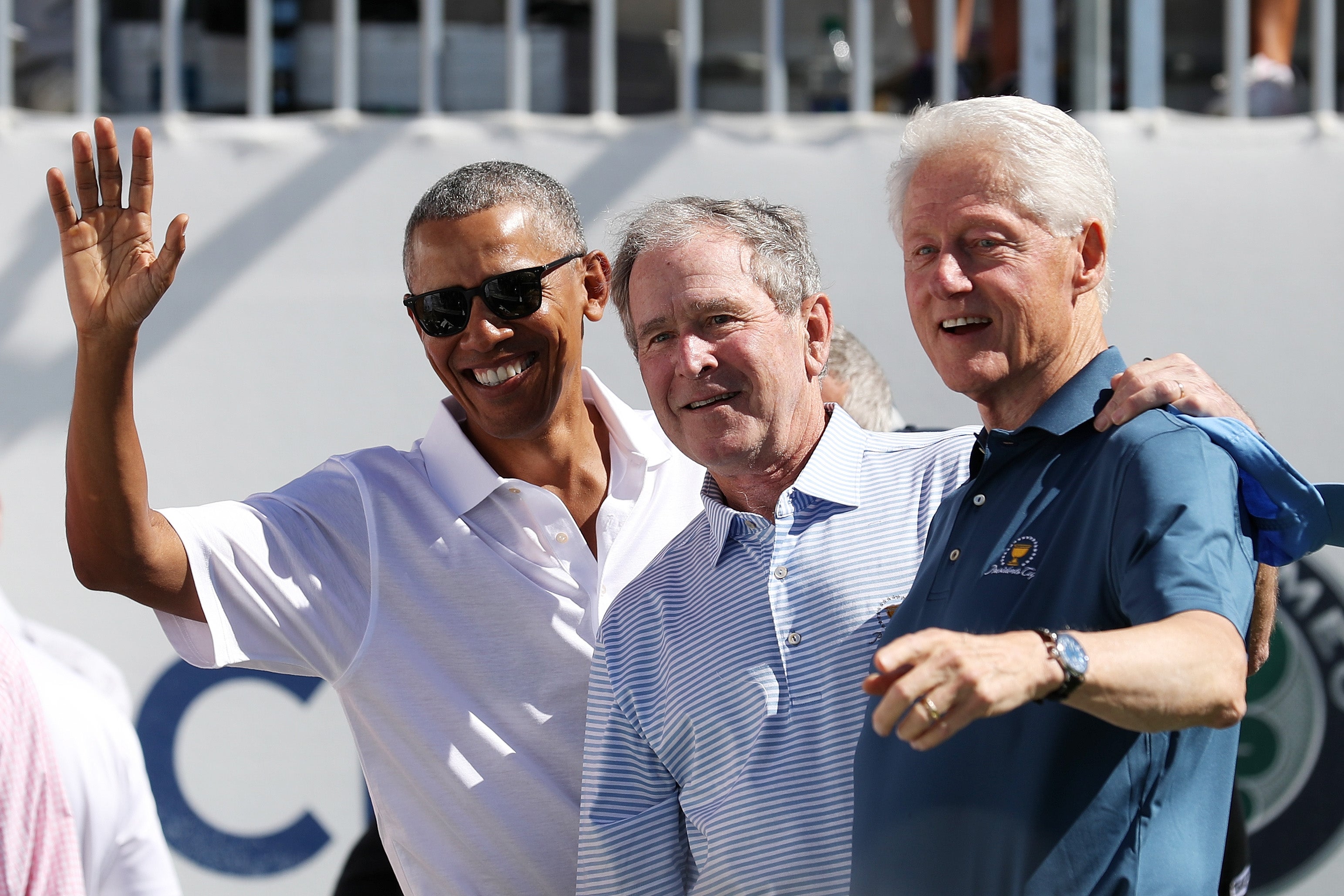
“I don’t think Bush deserves a quiet retirement,” she says. “I don’t think he deserves people like Ellen DeGeneres sitting next to him and giving him legitimacy like he’s just some nice guy. I don’t think he deserves the rehabilitation or softening of his image. I think he belongs in prison.”
“Only in America can a war criminal reinvent himself as the new Bob Ross,” says Michael Moore, the lefty documentarian whose 2003 movie Fahrenheit 9/11 took a critical look at Bush’s presidency.
It’s been a tumultuous, let’s say, six years, where it’s been hard to keep track of the scandals and blunders from the previous week, let alone those from more than 13 years ago. It’s a lot to ask for people to remember how long Bush stayed on vacation before turning his attention to Hurricane Katrina, or how his administration started a war with Iraq under the false pretence that it had weapons of mass destruction, and had memos drafted to allow torture to be used as an intelligence-gathering technique.
“You gotta hand it to us,” Moore tells The Post. “We are a forgiving people, and a forgetful people.”
Trudeau used to spend a lot of time thinking about Bush – and skewering him in his long-running newspaper strip, Doonesbury.
“My view changed as he did,” Trudeau writes in an email. “What started as a feckless, unfocused presidency assumed under a mantle of privilege and legacy suddenly became operationalised by 9/11. Like his father, Bush didn’t seem to know what presidents actually did in the absence of war.”
The caricature of Bush that took shape during his presidency wasn’t of a malevolent tyrant, but of a fratboy-in-chief. On Saturday Night Live, Will Ferrell played him as a snickering man-child. In a sketch depicting the 2000 ballot recount as a daytime soap, actors playing Al Gore, Jeb Bush and Tom Brokaw talk gravely about the state of things while Ferrell, as Bush, plays with a ball of string.
This version of Bush was an idiot, and a useful one at that, seen to be taken advantage of by the real Machiavellians of his administration (see: Cheney, Dick). “A big part of the critique at the time is that he was sort of a failson that was a vehicle for these people,” says Josh Marshall, who chronicled the Bush years on his website, Talking Points Memo. “That probably makes it easier for the public to be OK with him leaving everything behind and becoming a painter. Whether it’s true or not.”
According to those who served with Bush, it’s not.
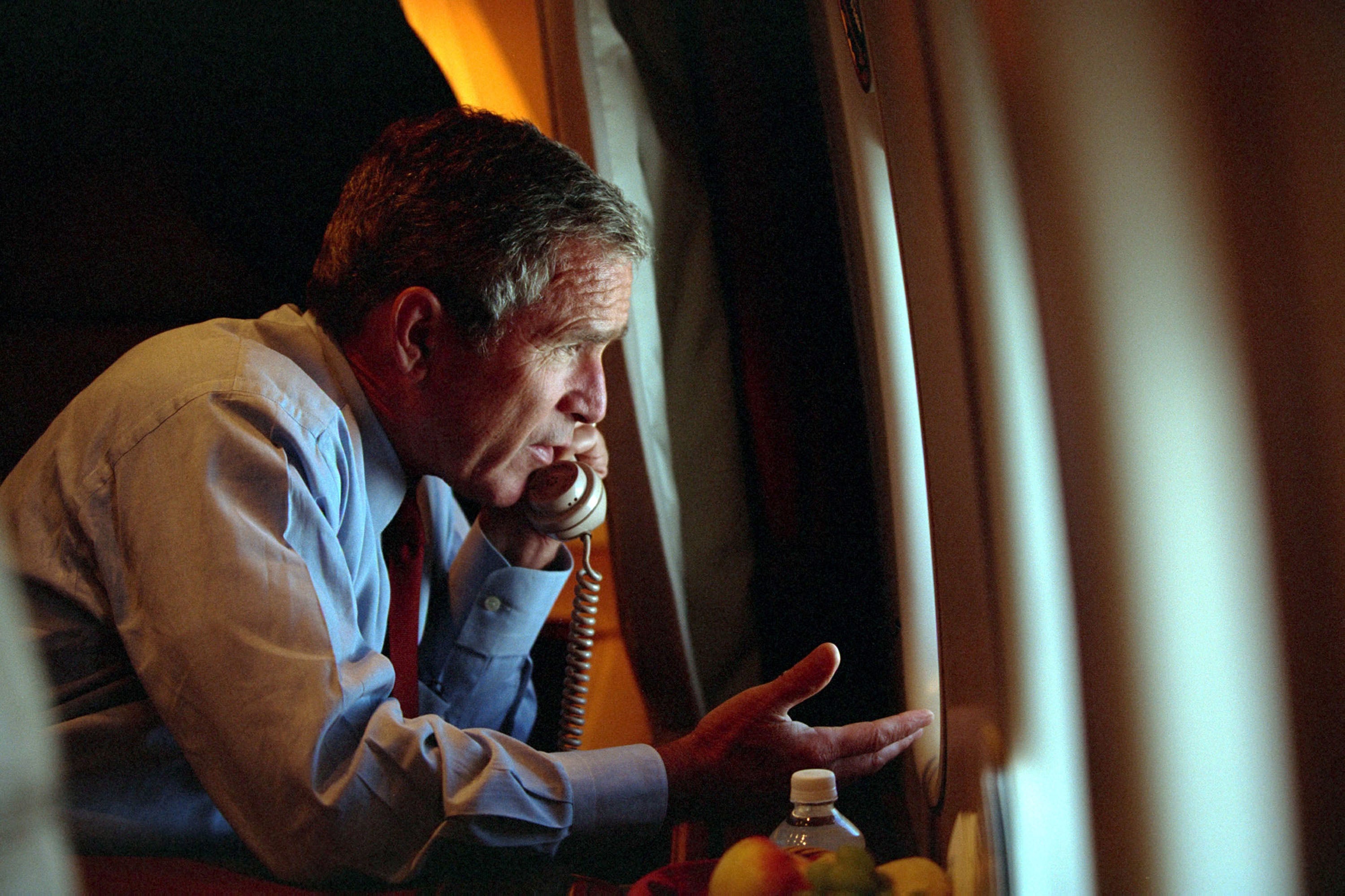
“The reality was completely different from Saturday Night Live,” says Michael Chertoff, Bush’s second secretary of homeland security. According to Chertoff – and also to his current business partner, Michael Hayden, the former CIA director – Bush was an active and thoughtful participant in briefings, knowledgeable about the issues, and responsible for the big decisions.
This defence for Bush inevitably raises the question: which is worse? A president who reads the intelligence and misuses it, or a president who can’t be bothered to sit through a briefing in the first place?
“I’m not sure I have a good answer for that,” says Marshall. “They are just bad in very different ways. You can say that for all of Trump’s terribleness, he wasn’t able to break as much abroad. But then again, he was a president who didn’t accept the results of an election, and I don’t know how much worse you can get than that.”
“I think we judge presidents on outcomes,” said Chertoff, “but more important than any particular policy outcome is the fundamental process question: do presidents promote our constitutional democracy, or do they try to undermine it?”
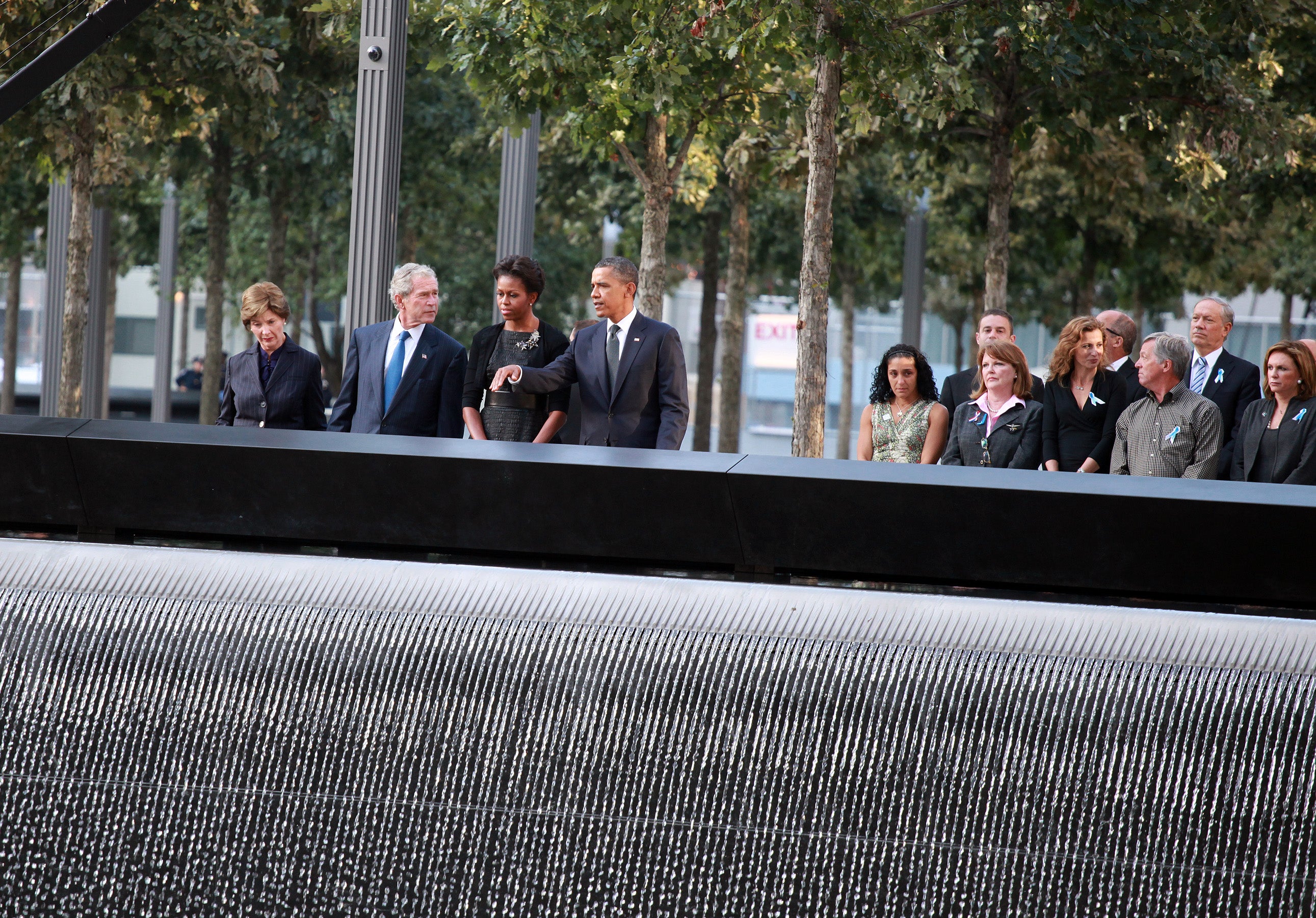
Bush’s own popularity has clearly benefitted from his time out of office. Irrelevance proved to be a disinfectant. In 2018, a poll from CNN found that Bush was viewed favourably by about 6 in 10 Americans. It got to the point where another familiar face had to come out from retirement to stage an intervention.
“I just wanted to address my fellow Americans tonight, and remind you guys that I was really bad,” said Ferrell said, reprising his role as Bush for an SNL guest spot that year. “Like, historically not-good.”
The fact that Bush no longer holds any sway might help explain the surge in his popularity.
The tendency of partisans to hate their opponents when they are in power and praise them when they are powerless is so predictable that Rep Dan Crenshaw, R-Texas, says he can’t take the newfound nostalgia for Bush seriously.
“We’re talking about the liberal media here,” says Crenshaw, a former navy seal who fought in Afghanistan. “They always say, ‘Yeah, those old Republicans used to be decent’.”
On the very day Trump took office, Bush gave the critics who once thought of him as a dangerous liar reason to think of him as a truth-teller; reportedly saying of the inauguration: “This is some weird s***.”
As the Columbia Journalism Review observed, on the weekend after the withdrawal from Afghanistan first turned toward chaotic, the Sunday shows neglected to bring up his name once
“There are lots of Republican leaders who will whisper about how they miss Bush,” says Frank Luntz, a pollster who recently renounced his affiliation with the GOP. “But those conversations are happening in places like the Hamptons, Nantucket and Martha’s Vineyard.”
It is clear that most everywhere else, this is no longer Bush’s party. Trump wiped the floor with Bush’s brother, Jeb, in the 2016 presidential primary by dissing the entire Bush dynasty, calling the Iraq War a “a big fat mistake” and accusing George W of failing to keep America safe because he let 9/11 happen on his watch.
The GOP has only moved further into Trump’s camp since then, to the chagrin of the Bush clan. This year, Jeb’s son, George P Bush, attempted to win support from Trump for his race to become the next attorney general of Texas. Instead, Trump threw his support behind Ken Paxton, the current AG, threatening to squash Bush’s candidacy like so many poo-poo cushions.
“One of the big questions hanging over politics is, ‘What is the Republican Party?’” says Chertoff. “Does it continue to exist? Is it totally taken over by Trump? Clearly the loudest voices in the Republican Party are not in the tradition of the Bushes.”
Bush seems content to remain one of the quieter voices.
“We don’t participate in profiles/legacy pieces,” his spokesperson Freddy Ford says when reached for comment. “We just aren’t seeking that kind of attention.”
Reticence seems to be working for him. It can seem like Bush is more likely to be mentioned on the Today show than in any hard-hitting segments. As the Columbia Journalism Review observed, on the weekend after the withdrawal from Afghanistan first turned toward chaotic, the Sunday shows neglected to bring up his name once.
The war in Afghanistan and the war over the future of the GOP may be coming to an end, but George W Bush had the privilege of withdrawing from both a long time ago.
How lucky is he?
© The Washington Post




Join our commenting forum
Join thought-provoking conversations, follow other Independent readers and see their replies
Comments